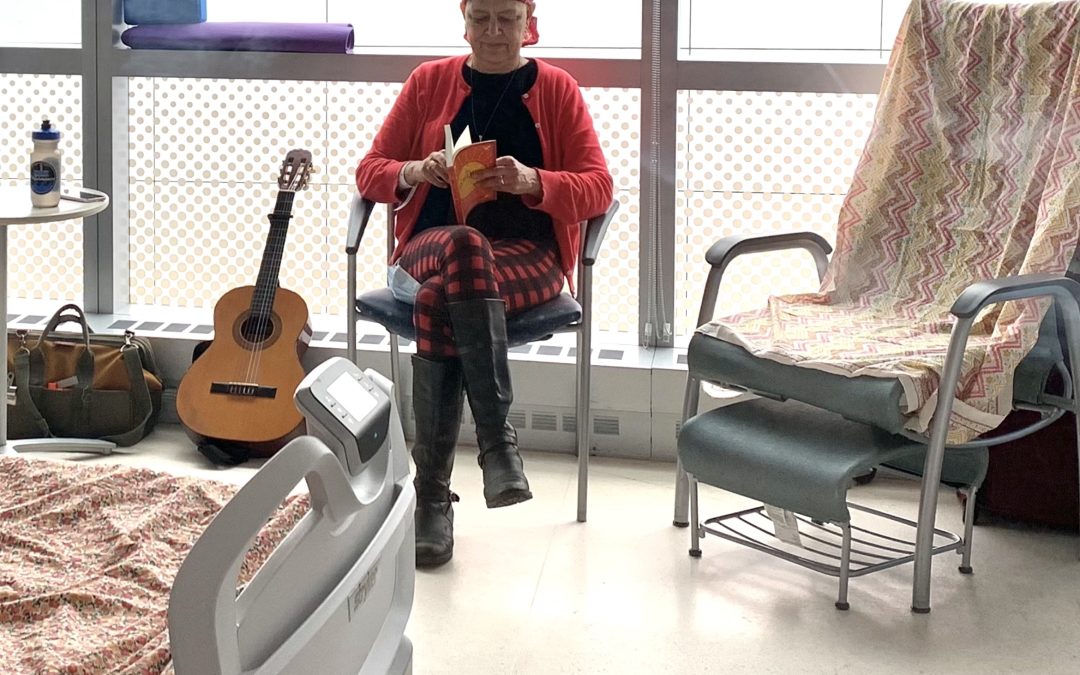I don’t want to be cavalier.
I don’t want to take one tiny bit for granted.
And I don’t want to jinx anything.
That said, I feel damn good. Bounced back from two months of chemo and now am taking in my immunotherapy 24/7, but have no sense of it, except for the ever-present fanny pack. I make every rookie error: forget the pack on the table and get up to walk away; nearly trip over the tubing going down the stairs, catch one of my straps on a drawer handle, almost dip part of the belt into, dare I say, the loo! Hard to keep constant awareness of a new appendage.
I am grateful for these weeks of immunotherapy and hope I remain without side effects. After another cycle of BLINA, we envision zero leukemia cells, when I will be best poised for a successful, enduring, stem cell transplant in the new year. It’s now my time to rebuild, whip myself further into shape, focus on my head game (ongoing project,) get some work done, and enjoy the fall, my people, my home, my community, and myself!
Intermittently, I am listening to the (interminable) Covenant of Water by Abraham Verghese. At 760 pages, it’s not a light read while it weaves three generations, politics, Indian culture and history, love stories, unfathomable loss, and a whole lot of hope. Layered into most every chapter is a smorgasbord of medical detail I imagine is not everyone’s cup of tea: anatomy, physiology, pathology, philosophy, surgery, dissection, trauma. There is a treasure trove of detailed description of pathology, everything from Down Syndrome, to leprosy, to acoustic neuroma, and more. This book starts out in 1900, so Verghese describes many ailments endured that are no longer common threats—I should say, in the developed world—such as diphtheria and typhus. There is also a generous sprinkling of the food, teas, and herbal home remedies passed down mostly through women, which are not far afield from my own line of work.
Verghese’s prodigious ability to write about the human body, and the ways things go wrong from either genetic inheritance, environmental exposure and experience, and plain bad luck and how doctors and healers understand the application of medicine, moves me. I am pulled back to the smell of formaldehyde from anatomy dissection lab; I recall a frequent stiff neck from the first year of naturopathic medical school, much of it spent bent over a microscope in histology lab learning about and being blown away by the variety of cells that make up our body. And how cells form tissue and tissue form organs—it felt like essential education to learn anatomy and physiology and biochemistry to gain appreciation of how the body functions and how all the systems are orchestrated, both in the normal healthy state and in illness. My pathology teacher, of blessed memory, Dr. Khalsa, often read from Robbin’s Pathology, perhaps not the best pedagogy, but the narratives jumped off the page. It’s compelling for some of us biology nerds. Really, the fact that mostly things work and work well enough, most of the time, is the real miracle!
All this to say, going through treatment, I place myself on a continuum of scientific discovery related both to how we understand the human body and mind and how to fix the mistakes and ailments they sustain. I see how very far we’ve come and at the same time, the road ahead is without end. When we look at advancements in medicine, especially in oncology, it is humbling. And it’s also true that some current recommendations will seem barbaric in a few years, certainly in a few decades.
So sometimes, when I feel my providers are not giving it to me straight, or skirting a question, or being vague, I realize, they are! Medicine is as much an art as a science, we’re all learning as we are going along. It’s my deep hope and prayer that my own case, with its peculiarities and uniqueness will offer a kernel of understanding that may help the next person who presents similarly.
As you know, regardless of the swirl of conventional care I am taking in, I am devoted to my anti-inflammatory diet, staying hydrated (worst event for me!) daily exercise and a lot of it, quiet time, leaning into relaxing hobbies, keeping some sacred space even with the mounting stress in the world, being with the people I love, and using our gentle medicines, as indicated, often with Paul as conductor, to headed off or address any side effects that arise.
My secret aspiration, okay, maybe not so secret, is that some of what I know and do and live (and practice and teach and write about….) will also rub off on my providers to emphasize lifestyle and more natural medicine approaches to complement oncology care in order to help improve patient treatment experience as well as outcomes. This is equally true for survivors, oh gosh, I wrote a whole book on that, didn’t I!?
We’re all in this together and knowledge is cumulative. Long live the curious and open mind! Shout out for collaboration! Bless the researchers and clinicians who care about helping people feel their best regardless of their diagnosis or prognosis! And may the force of all manner of healing, for all the ways we suffer, make its way across this grand planet and all its inhabitants.
Love and light from Middle Street,
AMY
#collaboration #thriver #leukemia #advancesinmedicine #naturopathic

